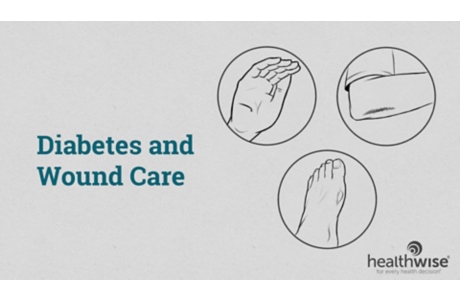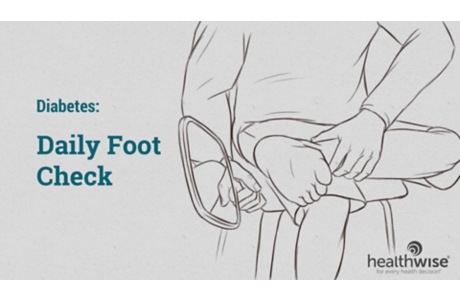Overview
When you have diabetes, your feet need extra care and attention. Diabetes can damage the nerve endings and blood vessels in your feet, making you less likely to notice when your feet are injured. Diabetes also limits your body's ability to fight infection and get blood to areas that need it. If you get a minor foot injury, it could become an ulcer or a serious infection. With good foot care, you can prevent most of these problems.
Caring for your feet can be quick and easy. Most of the care can be done when you are bathing or getting ready for bed.
How do you care for your feet?
When you have diabetes, the nerves and blood vessels in your feet can get damaged. Your feet may feel numb, and injuries may take longer to heal. By giving your feet extra care and attention, you can prevent injuries and infections.
- Check your feet daily for blisters, cuts, cracks, sores, broken skin, corns, calluses, or ingrown toenails.
Look at all areas of your feet, including your toes. You can use a mirror to see all parts of your feet. If you cannot see well, have someone help you. Make a note of any areas that tingle or are numb.
- Wash your feet every day.
- Use warm (not hot) water. Check the water temperature with your wrists or another part of your body, not your feet.
- Dry your feet well. Pat them dry. Do not rub the skin on your feet too hard. Dry well between your toes.
- Keep your skin soft.
Put a thin layer of lotion on your feet, but not between your toes.
- Keep your nails trimmed.
You may want to have someone else trim your nails to avoid cutting the skin around them.
- Wear shoes and socks that fit well and support your feet.
- You can get hard-sole shoes that provide better arch support and are less likely to be pierced through the sole.
- Break in new shoes slowly by wearing them for no more than an hour a day for several days.
- Look for shoes that have plenty of space around the toes. This helps prevent bunions and blisters.
- Avoid plastic shoes. They may rub your feet and cause blisters. Good shoes should be made of materials that are flexible and breathable, such as leather or cloth.
- Wear socks without seams. You can find socks for people with diabetes from specialty catalogs.
- Change your socks daily.
- Protect your feet from injury.
- Look inside your shoes every day for things like gravel or torn linings, which could cause blisters or sores.
- Inspect your feet for blisters, cuts, or scrapes after outdoor activities.
- Put sunscreen on the tops of your feet when they will be exposed to the sun.
- Never go outside barefoot.
- Have your doctor check your feet during each visit.
Your doctor may notice a foot problem you have missed.
- If you have a foot problem, see your doctor.
Always get early treatment for foot problems. Call your doctor even for minor foot problems, unless you have already learned from your doctor how to handle these problems.
- Have a complete foot exam by your doctor or a podiatrist at least once a year.
This exam can detect a loss of feeling in your feet, which can lead to more serious foot problems.
Credits
Current as of: October 2, 2023
Author: Healthwise Staff
Clinical Review Board
All Healthwise education is reviewed by a team that includes physicians, nurses, advanced practitioners, registered dieticians, and other healthcare professionals.
Current as of: October 2, 2023
Author: Healthwise Staff
Clinical Review Board
All Healthwise education is reviewed by a team that includes physicians, nurses, advanced practitioners, registered dieticians, and other healthcare professionals.







